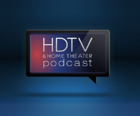 Jul 29
Jul 29 Podcast #750: QLED Explained
 A few weeks ago we mentioned that Samsung would be investing in QLED technology and we thought that QLED was just a clever branding name for Quantum Dot technology. It was quickly pointed out that QLED is indeed a separate technology and one that may give OLED a run for it's money.
A few weeks ago we mentioned that Samsung would be investing in QLED technology and we thought that QLED was just a clever branding name for Quantum Dot technology. It was quickly pointed out that QLED is indeed a separate technology and one that may give OLED a run for it's money.
| Download this Episode. |
Support the show with Patreon!
Listen to the show
Today's Show:
News:
- Vizio Being Sold To LeEco
- LG Display reports 91% drop in operating profit
- J.D. Power Crowns Samsung & Sony Winners In 2016 TV Satisfaction Report
Other:
- Alex Karam developed PostVu App More info at PostVu.com
- Listener Review of Sling TV on AppleTV
- Science Says: Smarter Home Equals Higher Value
- High Resolution Audio Perception Meta-Analysis
Amazon Prime:
Sign up for Amazon Prime and enjoy:
- Free Two Day Shipping!
- Instant Streaming of TV Shows and Movies
- Instant Access to thousands of Kindle Books
- The HT Guys gratitude!
QLED Explained
A few weeks ago we mentioned that Samsung would be investing in QLED technology and we (Ara) thought that QLED was just a clever branding name for Quantum Dot technology. It was quickly pointed out that QLED is indeed a separate technology and one that may give OLED a run for it's money.
QLED is an acronym for “Quantum Dot Light Emitting Device” and are a form of light emitting technology and consist of nano-scale crystals. The structure of a QLED is very similar to the OLED technology. But the difference is that the light emitting centers are cadmium selenide (CdSe) nanocrystals, or quantum dots. A layer of quantum dots is sandwiched between layers of organic materials. An applied electric field causes electrons and holes to move into the quantum dot layer where they are captured in the quantum dot and recombined emitting photons. What???? In short, when these tiny molecules are hit with an electric charge they absorb light and then give off a different color light.
QLEDs advantages (according to QLED trade group)
- Pure color — Will deliver 30-40% luminance efficiency advantage over organic light emitting diodes (OLEDs) at the same color point.
- Low power consumption — QLEDs have the potential to be more than twice as power efficient as OLEDs at the same color purity.
- Low-cost manufacture — The ability to print large-area QLEDs on ultra-thin flexible substrates will reduce luminaire manufacturing cost.
- Ultrathin, transparent, flexible form factors — QLEDs will enable designers to develop new display and lighting forms not possible with existing technologies.
QLED disadvantages (according to OLED trade group)
- Lifetime and emitting efficiency - When mass producing QLED, pin holes occur and reduce device lifetime, and as the hole and electron are not balanced the emitting efficiency falls.
- No TVs in production - The first QLED TVs are expected in 2018 and will be expensive. In the mean time OLED production is improving and costs coming down.
Who Cares??
Seriously who cares? Let’s assume that everything the QLED trade group is saying about QLEDs advantages are true and that everything the OLED trade group is saying about the QLEDs disadvantages are false. Then we have yet another great choice for TVs. And it will be lower cost, lighter, and use less energy. We the consumer wins!
On the other hand let’s say the opposite is true and QLED flops and Samsung is forced to go the OLED route. Then OLED gets better and we the consumer wins again. Since margins are so small on the lower end TVs manufacturers are looking for a killer technology to warrant higher prices for videophiles. As a result, our TVs keep getting better. You may not be a videophile and can never see yourself spending more than $1,500 of a 50 inch TV but… keep in mind, today’s videophile technology is tomorrow’s $1,500 50 inch TV!!


Reader Comments (3)
Vizio...yet another company (and part of the country) going to China. Isn't it bad enough their sets are being made there. First Vizio makes the mistake of going public now this. I have one Vizio TV...highly doubt I'll ever get a second.
-Unhappy Vizio customer
Hey guys, I love the show and have learned so much from your expertise. I must take issue with Ara's comment about high resolution audio not being worth it if you can't hear it all the time or appreciate it without being a trained listener. I sold audio back in the 80s and I continue to be an enthusiast, albeit on a budget. I don't own any high resolution digital audio gear and I do not expect to until it is much less expensive. Yet, one could make the same argument against high end television. My wife doesn't see the need for a better set, even when I show her the very nice models on display with what I would assess to be much improved displays over what we have now. You could make the same argument against quality automobiles, wristwatches, cameras, binoculars, etc. Unless I missed something, I thought the point of improving all these things was to elevate the state of the art, typically financially supported in the early stages by the more enthusiastic early adopters. I get it if high resolution audio doesn't excite or impress you if you aren't trained to appreciate it. It wouldn't be worth the money for you. You do appreciate modern high performance televisions and home theater gear - because you have trained yourself to do so, I would think. I suspect it is more a matter of how important a particular pursuit is to you than anything else. Again, I love your show and look forward to listening each week. One more thing: do you have a buyer's guide for gear? Many thanks.
Hi Fritz,
We do say the same thing about TVs. We are on record as saying a 4K TV is not worth it if you have a screen size less than 75". And even then its marginal. HDR and expanded color is where the big improvement is.
So yes! the exact same thing would apply to HDTVs. When I helped my mom buy her current TV I chose a cheap TV and didn't even calibrate it. I changed the setting to normal and called it a day. Becuase in her case a $5K OLED would be a waste since she would never see the difference. That is all our point is. If you can't tell the difference save your money. If you can see/hear a difference more than say 60% of the time and you have the money by all means go for the hi res. We are just trying let let our readers/listeners make up their minds with their eyes and ears. Not what they read online, including our ramblings :-)
We put out a buyers guide each year around the holidays so it has a pretty short shelf life with how fast tech changes.
Thank you for your feedback and support!
Ara